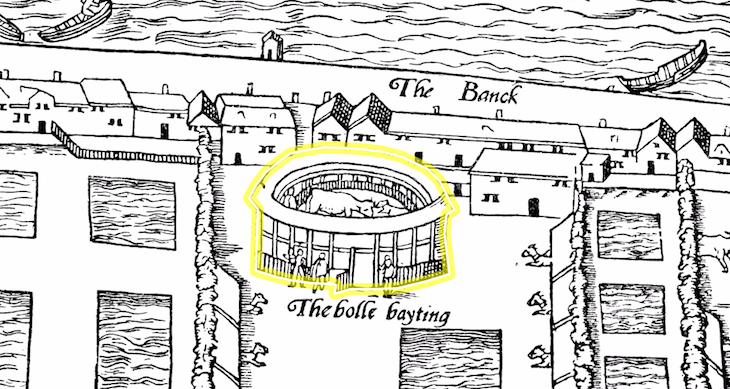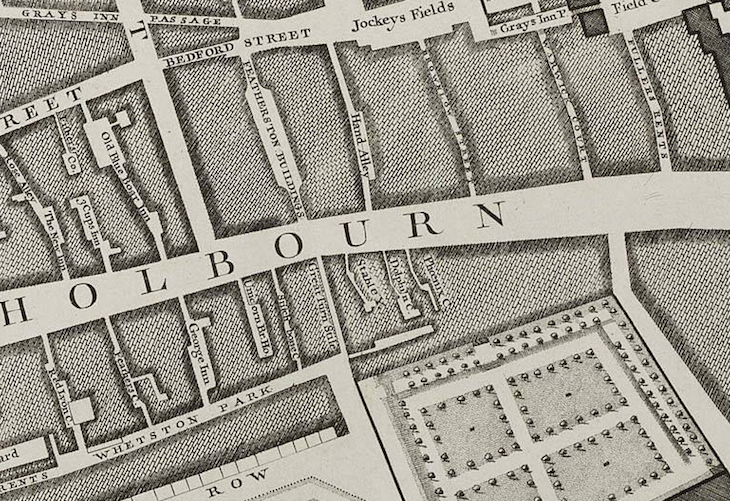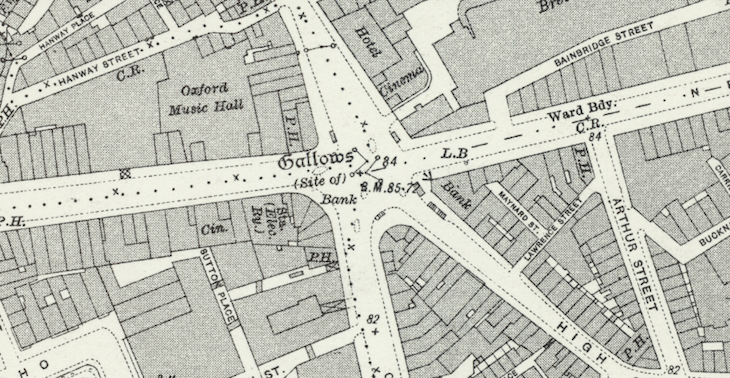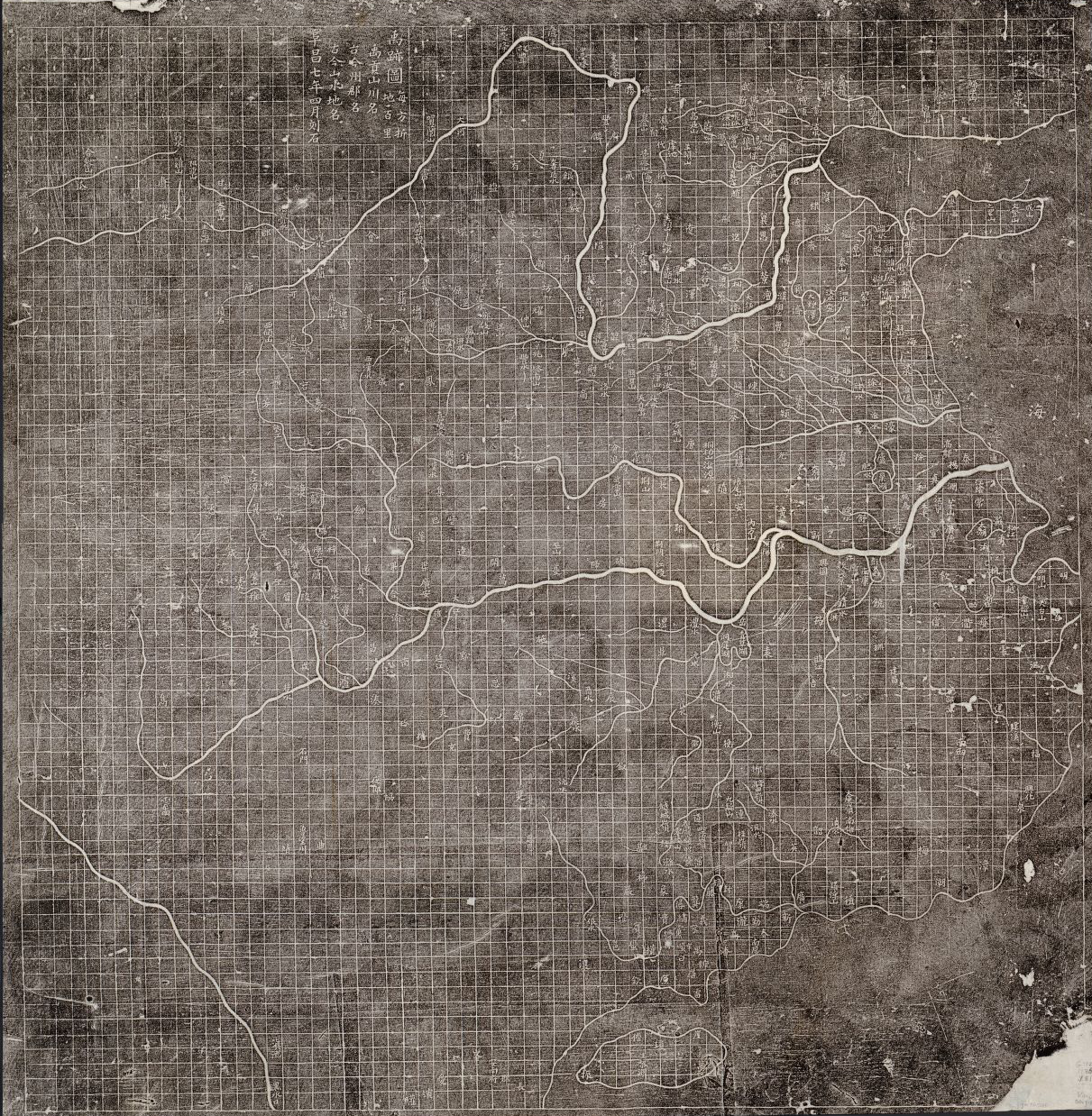
A PERSONAL JOURNAL, KEPT LARGELY TO RECORD REFERENCES TO WRITINGS, MUSIC, POLITICS, ECONOMICS, WORLD HAPPENINGS, PLAYS, FILMS, PAINTINGS, OBJECTS, BUILDINGS, SPORTING EVENTS, FOODS, WINES, PLACES AND/OR PEOPLE.
About Me
- Xerxes
- New Orleans, Louisiana, United States
- Admire John McPhee, Bill Bryson, David Remnick, Thomas Merton, Richard Rohr and James Martin (and most open and curious minds)
31.5.17
30.5.17
29.5.17
28.5.17
27.5.17
London
The Best Old Maps Of London
BY M@LAST EDITED 6 MONTHS AGO

Even at low-resolution, the John Rocque map of London (above) is a thing of beauty. But zoom in and you can see the names of individual alleyways, the empty field where your office now stands, and even the individual oars of boats upon the Thames. You can move across town with godlike abandon in this free, online version.
Rocque's map is not alone. Hundreds of old maps of London are available online — from the first maps of the 16th century to the famous Victorian poverty maps of Charles Booth. Below, we've picked out five of our favourites, all of which are freely available in high resolution.
Woodcut map of London, ~1560/1633

This is the earliest complete(ish) map of London in existence, probably based on the earlier-still Copperplate Map, which is mostly lost. The original version, from the 1560s, was long believed to be the work of cartographer Ralph Agas, and so sometimes goes by the name of the Agas Map. Historians now doubt the attribution. Sadly, that early version is itself lost, but a similar woodcut copy from ~1633 survives. This map has been digitised and impressively annotated by a project called The Map of Early Modern London.
Favourite detail: Our cartographer is largely untroubled by the rules of perspective drawing and proportion. Hence, the map is peppered with oddities, like the house-sized cattle in the 'bolle bayting' ring, shown above on Bankside. Also, those squiggle-filled rectangles: they're pike farms, apparently.
John Rocque Map, 1746

John Rocque gave us the first detailed map of London. His 1746 map includes every named court and alleyway. It shows a much smaller city, with areas like Bloomsbury, Marylebone and most of Southwark largely undeveloped. The best version online is presented by Motco. The navigation is a little clunky, but you can zoom in to a resolution where street names are clear.
Favourite detail: a pair of intriguing neighbours in Shoreditch: 'Mr Witanoom's Vinegar Yard' and the 'Holy-Well Mount' (recently excavated, next to the Pizza Express).
Richard Horwood's Map, 1792-99

Matthew Sangster has taken a digital version of this important Georgian map, and overlaid it with clickable pins, including notes from a 1789 guidebook to London, or aquatints from the period.
Favourite detail: The area that would one day be Victoria is mostly underwater, in a series of basins and side-arms of the Grosvenor canal (see pic).
Charles Booth Poverty Maps, 1886-1903

The Charles Booth Online Archive preserves the notebooks and maps of the great social surveyor, who toured the streets of Victorian and Edwardian London mapping levels of wealth — from the poshest (yellow) to the lowliest (black and blue). LSE's website has an almost unusable map interface, but the mobile version is much better, with intuitive zoom and the ability to superimpose on a modern map.
Ordnance Survey map, 1897

A supremely detailed map that shows London right down to its individual buildings, tram lines, underground railways, statues and public toilets. It even reveals where you'll find a dovecot in Buckingham Palace Gardens. The interface, from the National Library of Scotland, allows you to superimpose this remarkable old map over a modern map of the same scale, allowing direct comparison. This is an indispensable resource for anyone interested in the late Victorian period. Much of England and Scotland is covered in a similar way.
Favourite detail: The map goes out of its way to pack in information. It even includes long-lost landmarks such as the gallows at the foot of Tottenham Court Road (see pic).
26.5.17
25.5.17
JFK
|
24.5.17
Happy Birthdays
| It's the birthday of physicist Daniel Gabriel Fahrenheit, inventor of the mercury thermometer and the temperature scale of his namesake, born on this day in 1686 in modern-day Poland. When Fahrenheit was 15 years old, his parents died after eating poisonous mushrooms. His younger siblings were put into foster homes, but Daniel was old enough to become a merchant's apprentice in the Dutch Republic. It was in the merchant trade that he began to encounter thermometers as trade items. They had been invented just 60 years earlier, and measured temperature on a relative scale. Fahrenheit became so fascinated by the devices that he abandoned his apprenticeship, withdrew his inheritance, and ran away to study thermometer making. His hometown, angered at his defection from his government-appointed apprenticeship, placed a warrant for his arrest. He spent many years on the run from the authorities, learning more about glassblowing, physics, and chemistry along the way. Finally, at the age of 28, Fahrenheit became the first person to make a pair of thermometers that could give identical, objective readings. His scale is still the predominant American system of temperature measurement today. |
 |
| It's the birthday of American novelist Michael Chabon (books by this author), born in Washington, D.C. (1963). He won the Pulitzer Prize for his novel The Amazing Adventures of Kavalier & Klay (2000), about two Jewish cousins who create a popular comic book series during the 1940s. Chabon was inspired to write the book after reading about Joe Shuster and Jerry Siegel. They created the character of Superman, and sold the rights to the character to DC Comics for only $100.00. Chabon's novels are most often concerned with nostalgia, American Jewish identity, and pop culture. He says the correct way to pronounce his name is, "Shea, as in Shea Stadium, and Bon, as in Bon Jovi." Chabon's first novel was The Mysteries of Pittsburgh (1988), which he wrote as his thesis for the University of California-Irvine. His professor at the time loved it so much he sent it to his own literary agent, who got Chabon a great publishing deal. The book was a best-seller and became so popular Chabon was even asked to be in a Gap clothing ad. He declined the offer. Michael Chabon is the author of Wonder Boys (1995), The Yiddish Policeman's Union (2007), and Telegraph Avenue (2012). When asked how he gets the ideas for his novels, Chabon said, "Ideas are the easy part." His newest novel, Moonglow (2016), concerns a character named Michael Chabon who investigates the history of his family. Chabon based parts of the book on his grandfather's life, though it's up to the reader to figure out which parts are drawn from real life, like the fistfight in a barrette factory, encounters with Alger Hiss, and rocket scientist Werner von Braun. Chabon is notorious for his diligence when working on projects. He often writes five days a week, for five or six hours a day, trying to get at least 1,000 words written. He once spent five years working on a novel called Fountain City, about a man trying to build the perfect baseball park in Florida, and though he ultimately set the book aside, he considers the process to be a learning experience, saying, "I don't think I could have worked on Fountain City for five years and generated as much material as I did if I didn't have steady work habits. I think that if I learned anything, it's that you can feel completely despairing and hopeless and in over your head and lost and incompetent in the course of writing a book, but that doesn't mean all those things are true. You can fight your way through those periods to a new appreciation of what you're doing and to a firmer grip on the material. If I had known that with Fountain City, I might have fought just a little longer to try to pull it together." In the book, the main character's grandfather says: "After I'm gone, write it down. Explain everything. Make it mean something. Use a lot of those fancy metaphors of yours. Put the whole thing in proper chronological order, not like this mishmash I'm making you." |
 |
| It's the birthday of Bob Dylan (books by this author), born Robert Zimmerman in Duluth, Minnesota (1941). He grew up in the declining mining town of Hibbing, Minnesota. He was a quiet kid, raised by Jewish parents, who loved listening to the Grand Ole Opry. But after he heard Little Richard on the radio, he wanted to play rock and roll, so his dad bought him an electric guitar and he formed a rock band at his high school, The Golden Chords. Then he went to the University of Minnesota, and as soon as he got to Minneapolis and heard a record by the folk singer Odetta, he went and traded in his electric guitar for an acoustic one. Then a friend gave him Woody Guthrie's autobiography, and he was so inspired that he started learning all the folk songs he could and trying to sing like Woody. He performed in coffee shops around the university, and then, in 1961, when he heard that Woody Guthrie was dying of Huntington's disease in New York City, he left for the East Coast to meet his hero and become a musician. And he did both those things. He went to Greystone Hospital and found Woody Guthrie, and he played him songs, and visited him over and over. Later, Dylan said, "You could listen to his songs and actually learn how to live." He started performing in Greenwich Village clubs and coffeehouses, using the name Bob Dylan (he denies that he took his name from Dylan Thomas). He released his first album, Bob Dylan, in 1962. Within a space of just four years, the kid from Minnesota with the strange voice became a folk music sensation. In those years he released Bob Dylan, The Freewheelin' Bob Dylan, The Times They Are A-Changin', Another Side of Bob Dylan, and Bringing It All Back Home; he became a symbol of the protest movement and civil rights, and stood on stage with Joan Baez while Martin Luther King Jr. performed his "I Have a Dream" speech; and he moved from old ballads to writing his own folk songs all the way to "Like A Rolling Stone," which caused him to get booed at the Newport Folk Festival when he plugged in his electric guitar. Bob Dylan has been called one of the greatest songwriters of all time, and even one of the greatest poets of all time. He won a Nobel Prize in literature in 2016. |
 |
| It's the birthday of poet Joseph Brodsky (books by this author), born in St. Petersburg, Russia (1940). He grew up in the Soviet Union and began writing poetry as a young man. He became popular in underground literary circles, but in 1964 he was arrested for "social parasitism" and sentenced to five years' hard labor in Siberia. Writers and politicians from countries around the world protested his imprisonment, and he was released after 18 months. In 1972 he left Russia for America, where he taught at several universities. He had translated English poetry from the time he was a teenager, so he was already fluent in English when he arrived in America, but it took several years before he began writing poems primarily in English. He said he wrote in English as a form protest against the Soviet Union, and also so he could reach a wider audience. He won the Nobel Prize in literature in 1987, and from 1991 to 1992 he served as poet laureate of the United States. Brodsky said, "There are worse crimes than burning books. One of them is not reading them." |
23.5.17
Good Lines
37.9k Views 8Comments
Books have always been a way of escape for most of the people. Sometimes, just reading through the lines from books and hitting one line can hit you so hard that you just stop reading and start contemplating about what you just read. And these lines could go on to be the life changer for them
Here we have a short list of lines from books that can change your lives too as it did to many readers on reddit.
1.
“How we spend our days is of course, how we spend our lives.”~ The Writing Life, Annie Dillard
2.
“I must not fear. Fear is the mind-killer. Fear is the little-death that brings total obliteration. I will face my fear. I will permit it to pass over me and through me. And when it has gone past I will turn the inner eye to see its path. Where the fear has gone there will be nothing. Only I will remain.”~ Frank Herbert, Dune
3.
“Bran thought about it. ‘Can a man still be brave if he’s afraid?’ ‘That is the only time a man can be brave,’ his father told him.”~ George R.R. Martin, A Game of Thrones (A Song of Ice and Fire, #1)
4.
“I may not have gone where I intended to go, but I think I have ended up where I needed to be.”~ Douglas Adams, The Long Dark Tea-Time of the Soul
5.
“He soon felt that the fulfillment of his desires gave him only one grain of the mountain of happiness he had expected. This fulfillment showed him the eternal error men make in imagining that their happiness depends on the realization of their desires.”~ Leo Tolstoy, Anna Karenina
6.
“Those who know that they are profound strive for clarity. Those who would like to seem profound to the crowd strive for obscurity. For the crowd believes that if it cannot see to the bottom of something it must be profound. It is so timid and dislikes going into the water.”~Friedrich Nietzsche, The Gay Science
7.
“We accept the love we think we deserve.”~ Stephen Chbosky, The Perks of Being a Wallflower
8.
“Cowards die many times before their deaths, the valiant never taste of death but once.”~ William Shakespeare, Julius Caesar
9.
“Our lives are not our own. From womb to tomb, we are bound to others, past and present. And by each crime and every kindness, we birth our future. I believe there is another world waiting for us, a better one. And I’ll be waiting for you there.”~ David Mitchell, Cloud Atlas
10.
“So do all who live to see such times. But that is not for them to decide. All we have to decide is what to do with the time that is given us.”~ J.R.R. Tolkien, The Fellowship of the Ring
11.
“Now it was again a green light on a dock. His count of enchanted objects had diminished by one.”~ F. Scott Fitzgerald, The Great Gatsby
12.
“Jealousy is a disease, love is a healthy condition. The immature mind often mistakes one for the other, or assumes that the greater the love, the greater the jealousy – in fact, they are almost incompatible; one emotion hardly leaves room for the other.”~ Robert A. Heinlein, Stranger in a Strange Land
13.
“It is morally as bad not to care whether a thing is true or not, so long as it makes you feel good, as it is not to care how you got your money, so long as you have got it.”~ Carl Sagan, The Demon-Haunted World
14.
“You are who you pretend to be.”~ Kurt Vonnegut, Mother Night
15.
“Adversity is like a strong wind. It…tears away from us all but the things that cannot be torn, so that afterward we see ourselves as we really are, and not merely as we might like to be.”~ Arthur Golden, Memoirs of a Geisha
16.
“The price of self-destiny is never cheap, and in certain situations it is unthinkable. But to achieve the marvelous, it is precisely the unthinkable that must be thought.”~ Tom Robbins, Jitterbug Perfume
17.
“All men dream, but not equally. Those who dream by night in the dusty recesses of their minds, wake in the day to find that it was vanity: but the dreamers of the day are dangerous men, for they may act on their dreams with open eyes, to make them possible.”~ T E Lawrence, Seven Pillars of Wisdom
18.
“When one person suffers from delusion, it’s called insanity, when many suffer, it’s called religion.”~ Robert Pirsig, Zen and the Art of Motorcycle Maintenance
19.
“Happiness is the highest form of wisdom’.”~ Jacqueline Carey, Kushiel’s Mercy
20.
“What am I living for and what am I dying for are the same question.”~ Margaret Atwood, The Year of the Flood
21.
“Who controls the past controls the future. Who controls the present controls the past.”~ George Orwell, 1984
Subscribe to:
Posts (Atom)






